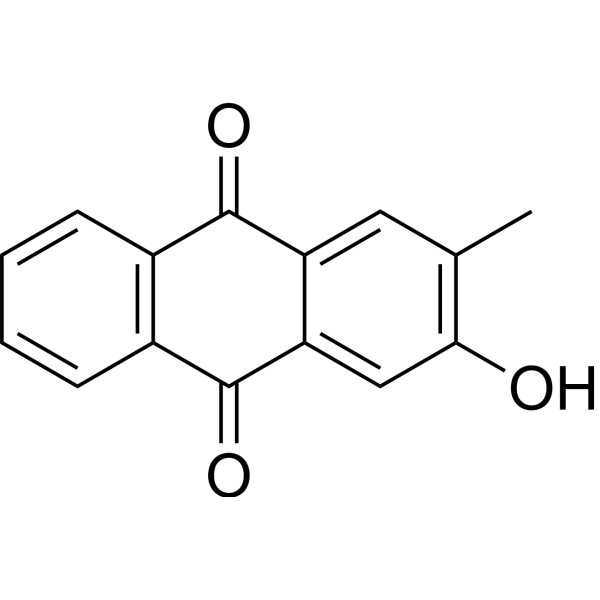
2-Hydroxy-3-methylanthraquinone
CAS No. 17241-40-6
2-Hydroxy-3-methylanthraquinone( —— )
Catalog No. M30880 CAS No. 17241-40-6
2-Hydroxy-3-methylanthraquinone enhances apoptosis of U937 cells,in part,through activation of p-p38MAPK and downregulation of p-ERK1/2; triggers caspase-3 activation mediated apoptotic induction.
Purity : >98% (HPLC)
 COA
COA
 Datasheet
Datasheet
 HNMR
HNMR
 HPLC
HPLC
 MSDS
MSDS
 Handing Instructions
Handing Instructions
| Size | Price / USD | Stock | Quantity |
| 5MG | 495 | In Stock |


|
| 50MG | Get Quote | In Stock |


|
| 100MG | Get Quote | In Stock |


|
Biological Information
-
Product Name2-Hydroxy-3-methylanthraquinone
-
NoteResearch use only, not for human use.
-
Brief Description2-Hydroxy-3-methylanthraquinone enhances apoptosis of U937 cells,in part,through activation of p-p38MAPK and downregulation of p-ERK1/2; triggers caspase-3 activation mediated apoptotic induction.
-
Description2-Hydroxy-3-methylanthraquinone enhances apoptosis of U937 cells,in part,through activation of p-p38MAPK and downregulation of p-ERK1/2; triggers caspase-3 activation mediated apoptotic induction.
-
In Vitro——
-
In Vivo——
-
Synonyms——
-
PathwayOthers
-
TargetOther Targets
-
Recptor——
-
Research Area——
-
Indication——
Chemical Information
-
CAS Number17241-40-6
-
Formula Weight238.2
-
Molecular FormulaC15H10O3
-
Purity>98% (HPLC)
-
Solubility——
-
SMILES——
-
Chemical Name——
Shipping & Storage Information
-
Storage(-20℃)
-
ShippingWith Ice Pack
-
Stability≥ 2 years
Reference
molnova catalog



related products
-
Citrusin B
Citrusin B exhibits moderate in vitro inhibitory effect on tobacco mosaic virus replication with IC50 values 0.26?mmol?L?1.
-
Ibacitabine
Ibacitabine is a drug with the activity of antiviral.It?is a compound used in the construction of DNA oligomers.
-
Bacopaside N1
Bacopaside N1 is a diglycosidic saponin.



 Cart
Cart
 sales@molnova.com
sales@molnova.com


